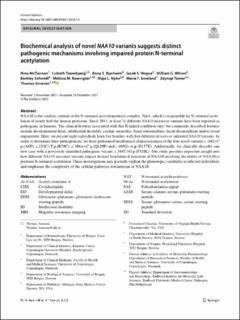Biochemical analysis of novel NAA10 variants suggests distinct pathogenic mechanisms involving impaired protein N‑terminal acetylation
McTiernan, Nina; Tranebjærg, Lisbeth; Bjørheim, Anna Steensen; Hogue, Jacob S.; Wilson, William G.; Schmidt, Berkley; Boerrigter, Melissa M.; Nybo, Maja L.; Smeland, Marie; Tümer, Zeynep; Arnesen, Thomas
Journal article, Peer reviewed
Published version

Åpne
Permanent lenke
https://hdl.handle.net/11250/2997244Utgivelsesdato
2022Metadata
Vis full innførselSamlinger
- Department of Biomedicine [742]
- Registrations from Cristin [10402]
Sammendrag
NAA10 is the catalytic subunit of the N-terminal acetyltransferase complex, NatA, which is responsible for N-terminal acetylation of nearly half the human proteome. Since 2011, at least 21 different NAA10 missense variants have been reported as pathogenic in humans. The clinical features associated with this X-linked condition vary, but commonly described features include developmental delay, intellectual disability, cardiac anomalies, brain abnormalities, facial dysmorphism and/or visual impairment. Here, we present eight individuals from five families with five different de novo or inherited NAA10 variants. In order to determine their pathogenicity, we have performed biochemical characterisation of the four novel variants c.16G>C p.(A6P), c.235C>T p.(R79C), c.386A>C p.(Q129P) and c.469G>A p.(E157K). Additionally, we clinically describe one new case with a previously identified pathogenic variant, c.384T>G p.(F128L). Our study provides important insight into how different NAA10 missense variants impact distinct biochemical functions of NAA10 involving the ability of NAA10 to perform N-terminal acetylation. These investigations may partially explain the phenotypic variability in affected individuals and emphasise the complexity of the cellular pathways downstream of NAA10.
